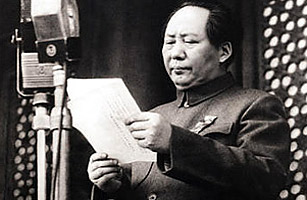
Mao declares the birth of the communist Peoples Republic.
Oct. 1, 1949
Mao Zedong inexplicably arrived an hour early at the red-lacquered Gate of Eternal Peace, entrance to the 500-year-old palace of China's emperors. He had chosen a symbol of ancient power in which to declare his new China. The man in charge of preparations, a loyal soldier named Guo Ying, 24, who had been fighting with the communists since he was 13, seated Mao in the former emperor's waiting room and fetched him a bowl of apples. There Guo learned that Mao, in his haste, had forgotten the ribbon that each new leader pins to his tunic.
Just outside, in Tiananmen Square, 300,000 people squinted through a yellow haze of soot to see the man who, after two decades of fighting, had routed the American-backed forces of Generalissimo Chiang Kai-shek. As Mao waited, Guo dispatched a comrade to find a piece of red satin and write "chairman" upon it in gold. That crisis averted, Mao stood on the rostrum above a massive portrait of himself and announced in his peasant brogue, "The central government of the People's Republic of China is established!" "Long live Chairman Mao!" answered the crowd, which began cheering soldiers fresh from battle as they marched in the new country's first military parade. Guo stood behind Mao and wept for "a victory won with the blood of millions of revolutionaries."